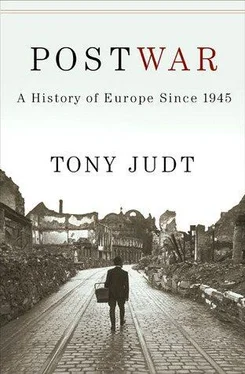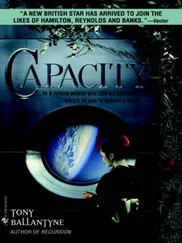Despairing of Europe, some fled: first to the remaining liberal democracies of far-western Europe, thence—if they could get out in time—to the Americas. And some, like Stefan Zweig or Walter Benjamin, took their own lives. On the eve of the continent’s final descent into the abyss the prospect for Europe appeared hopeless. Whatever it was that had been lost in the course of the implosion of European civilization—a loss whose implications had long since been intuited by Karl Kraus and Franz Kafka in Zweig’s own Vienna—would never be recaptured. In Jean Renoir’s eponymous film classic of 1937, the Grand Illusion of the age was the resort to war and its accompanying myths of honour, caste and class. But by 1940, to observant Europeans, the grandest of all Europe’s illusions—now discredited beyond recovery—was ‘European civilisation’ itself.
In the light of what had gone before it is thus understandably tempting to narrate the story of Europe’s unexpected recovery after 1945 in a self-congratulatory, even lyrical key. And this, indeed, has been the dominant underlying theme of histories of post-war Europe, above all those written before 1989—just as it was the tone adopted by European statesmen when reflecting upon their own achievements in these decades. The mere survival and re-emergence of the separate states of continental Europe after the cataclysm of total war; the absence of inter-state disputes and the steady extension of institutionalized forms of intra-European cooperation; the sustained recovery from thirty years of economic meltdown and the ‘normalization’ of prosperity, optimism and peace: all these invited a hyperbolic response. Europe’s recovery was a ‘miracle’. ‘Post-national’ Europe had learned the bitter lessons of recent history. An irenic, pacific continent had risen, ‘Phoenix-like’, from the ashes of its murderous—suicidal—past.
Like many myths, this rather agreeable account of Europe in the second half of the twentieth century contains a kernel of truth. But it leaves out a lot. Eastern Europe—from the Austrian border to the Ural Mountains, from Tallinn to Tirana—doesn’t fit. Its post-war decades were certainly peaceful when contrasted with what went before, but only thanks to the uninvited presence of the Red Army: it was the peace of the prison-yard, enforced by the tank. And if the satellite countries of the Soviet bloc engaged in international cooperation superficially comparable to developments further west, this was only because Moscow imposed ‘fraternal’ institutions and exchanges upon them by force.
The history of the two halves of post-war Europe cannot be told in isolation from one another. The legacy of the Second World War—and the pre-war decades and the war before that—forced upon the governments and peoples of east and west Europe alike some hard choices about how best to order their affairs so as to avoid any return to the past. One option—to pursue the radical agenda of the popular front movements of the 1930s—was initially very popular in both parts of Europe (a reminder that 1945 was never quite the fresh start that it sometimes appears). In eastern Europe some sort of radical transformation was unavoidable. There could be no possibility of returning to the discredited past. What, then, would replace it? Communism may have been the wrong solution, but the dilemma to which it was responding was real enough.
In the West the prospect of radical change was smoothed away, not least thanks to American aid (and pressure). The appeal of the popular-front agenda—and of Communism—faded: both were prescriptions for hard times and in the West, at least after 1952, the times were no longer so hard. And so, in the decades that followed, the uncertainties of the immediate post-war years were forgotten. But the possibility that things might take a different turn—indeed, the likelihood that they would take a different turn—had seemed very real in 1945; it was to head off a return of the old demons (unemployment, Fascism, German militarism, war, revolution) that western Europe took the new path with which we are now familiar. Post-national, welfare-state, cooperative, pacific Europe was not born of the optimistic, ambitious, forward-looking project imagined in fond retrospect by today’s Euro-idealists. It was the insecure child of anxiety. Shadowed by history, its leaders implemented social reforms and built new institutions as a prophylactic, to keep the past at bay.
This becomes easier to grasp when we recall that authorities in the Soviet bloc were in essence engaged in the same project. They, too, were above all concerned to install a barrier against political backsliding—though in countries under Communist rule this was to be secured not so much by social progress as through the application of physical force. Recent history was re-written—and citizens were encouraged to forget it—in accordance with the assertion that a Communist-led social revolution had definitively erased not just the shortcomings of the past but also the conditions that had made them possible. As we shall see, this claim was also a myth; at best a half-truth.
But the Communist myth bears unintended witness to the importance (and the difficulty) in both halves of Europe of managing a burdensome inheritance. World War One destroyed old Europe; World War Two created the conditions for a new Europe. But the whole of Europe lived for many decades after 1945 in the long shadow cast by the dictators and wars in its immediate past. That is one of the experiences that Europeans of the post-war generation have in common with one another and which separates them from Americans, for whom the twentieth century taught rather different and altogether more optimistic lessons. And it is the necessary point of departure for anyone seeking to understand European history before 1989—and to appreciate how much it changed afterwards.
In his account of Tolstoy’s view of history, Isaiah Berlin drew an influential distinction between two styles of intellectual reasoning, citing a famous line from the Greek poet Archilochus: ‘The fox knows many things but the hedgehog knows one big thing.’ In Berlin’s terms this book is decidedly not a ‘hedgehog’. I have no big theory of contemporary European history to propose in these pages; no one overarching theme to expound; no single, all-embracing story to tell. It does not follow from this, however, that I think the post-World War Two history of Europe has no thematic shape. On the contrary: it has more than one. Fox-like, Europe knows many things.
In the first place, this is a history of Europe’s reduction. The constituent states of Europe could no longer aspire, after 1945, to international or imperial status. The two exceptions to this rule—the Soviet Union and, in part, Great Britain—were both only half-European in their own eyes and in any case, by the end of the period recounted here, they too were much reduced. Most of the rest of continental Europe had been humiliated by defeat and occupation. It had not been able to liberate itself from Fascism by its own efforts; nor was it able, unassisted, to keep Communism at bay. Post-war Europe was liberated—or immured—by outsiders. Only with considerable effort and across long decades did Europeans recover control of their own destiny. Shorn of their overseas territories Europe’s erstwhile sea-borne empires (Britain, France, the Netherlands, Belgium, Portugal) were all shrunk back in the course of these years to their European nuclei, their attention re-directed to Europe itself.
Secondly, the later decades of the twentieth century saw the withering away of the ‘master narratives’ of European history: the great nineteenth-century theories of history, with their models of progress and change, of revolution and transformation, that had fuelled the political projects and social movements that tore Europe apart in the first half of the century. This too is a story that only makes sense on a pan-European canvas: the decline of political fervor in the West (except among a marginalized intellectual minority) was accompanied—for quite different reasons—by the loss of political faith and the discrediting of official Marxism in the East. For a brief moment in the 1980s, to be sure, it seemed as though the intellectual Right might stage a revival around the equally nineteenth-century project of dismantling ‘society’ and abandoning public affairs to the untrammelled market and the minimalist state; but the spasm passed. After 1989 there was no overarching ideological project of Left or Right on offer in Europe—except the prospect of liberty, which for most Europeans was a promise now fulfilled.
Читать дальше












